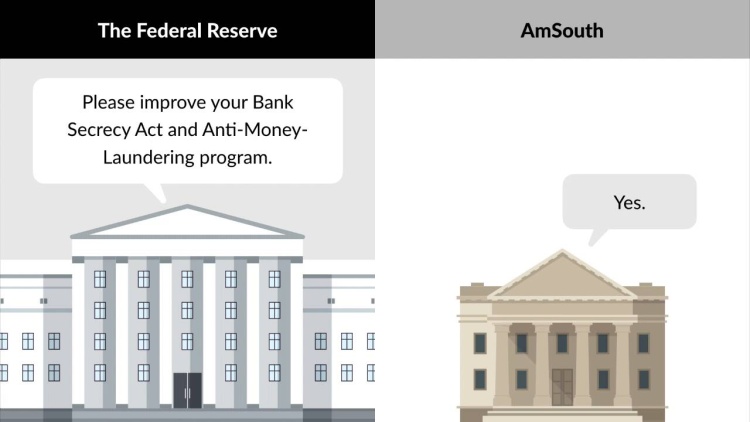Stone v. Ritter
Delaware Supreme Court
911 A.2d 362 (2006)

- Written by Sean Carroll, JD
Facts
AmSouth Bancorporation (AmSouth) was forced to pay $50 million in fines and penalties on account of government investigations about AmSouth employees’ failure to file suspicious-activity reports that were required by the Bank Secrecy Act (BSA) and anti-money-laundering (AML) regulations. AmSouth’s regulatory violations resulted from an AmSouth employee failing to follow the BSA/AML policies and procedures already in place. AmSouth’s directors were not penalized. The Federal Reserve and the Alabama Banking Department issued orders requiring AmSouth to improve its BSA/AML practices. The orders also required AmSouth to hire an independent consultant to review AmSouth’s BSA/AML procedures. AmSouth hired KPMG Forensic Services (KPMG) to conduct the review. KPMG found that the AmSouth directors had established programs and procedures for BSA/AML compliance, including a BSA officer, a BSA/AML compliance department, a corporate-security department, and a suspicious-banking-activity oversight committee. A group of shareholders (plaintiffs) brought a derivative suit against AmSouth directors (defendants) for failure to engage in proper oversight of AmSouth’s BSA/AML policies and procedures. The Delaware Court of Chancery deemed the shareholders’ allegations as a Caremark claim, which derives from In re Caremark International Inc. Derivative Litigation, 698 A.2d 959 (1996). Under Caremark, if a shareholder’s claim of directorial liability for corporate loss is based upon ignorance of liability-creating activities within the corporation, then only the board’s sustained or systematic failure can establish the lack of good faith that is required for liability. Applying the Caremark standard, the court of chancery dismissed the shareholders’ complaint. The shareholders appealed to the Delaware Supreme Court.
Rule of Law
Issue
Holding and Reasoning (Holland, J.)
What to do next…
Here's why 910,000 law students have relied on our case briefs:
- Written by law professors and practitioners, not other law students. 47,100 briefs, keyed to 997 casebooks. Top-notch customer support.
- The right amount of information, includes the facts, issues, rule of law, holding and reasoning, and any concurrences and dissents.
- Access in your classes, works on your mobile and tablet. Massive library of related video lessons and high quality multiple-choice questions.
- Easy to use, uniform format for every case brief. Written in plain English, not in legalese. Our briefs summarize and simplify; they don’t just repeat the court’s language.





